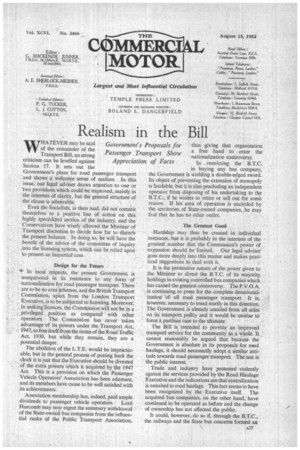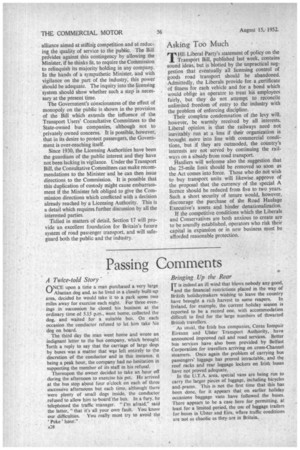Realism in the Bill
Page 29

Page 30

If you've noticed an error in this article please click here to report it so we can fix it.
WHATEVER may be said of the remainder of the Transport Bill, no strong criticism can be levelled against Section 17. It sets out the Government's plans for road passenger transport and shows a welcome sense of realism. In this issue, our legal adviser draws attention to one or "two provisions which could be improved, mainly in • the interests of clarity, but the general structure of • the clause is admirable.
Even the socialists, in their zeal, did not commit themselves to a positive line of action on this highly specialized section of the industry, and the Conservatives have wisely allowed the Minister of • Transport discretion to decide how far to disturb the present balance. In doing so, he will have the benefit of the advice of the committee of inquiry into the licensing system, which Can be relied upon to present an impartial case.
• Design for the Future In most respects, the present Government is unequivocal in its resistance io any form of nationalization for road passenger transport. There are to be no area schemes, and the British Transport Commission, apart. from the London Transport Executive, is to be subjected to licensing. Moreover, in seeking licences, the Commission will not be in a privileged position as compared with other operators. The Commission has never taken advantage-of its powers under the Transport Act, 1947, to free itself from the terms of the Road Traffic Act, 1930, but while they remain, they are a potential danger.
The abolition of the L.T.E. would be impracticable, but in the general process of putting back the clock it is just that the Executive should be divested of the extra powers which it acquired by the 1947 Act. This is a provision on which the Passenger Vehicle Operators' Association has been adamant, and its members have cause to be well satisfied with its achievements.
Association membership has, indeed, paid ample dividends to passenger vehicle operators. Lord Hurcomb may now regret the summary withdrawal of the State-owned bus companies from the influential ranks of the Public Transport Association, thus giving that organization a free hand to enter the nationalization controversy.
In restricting the B.T.C. in buying any bus company, the Government is wielding a double-edged sword. Its object of preventing the extension of monopoly is laudable, but it is also precluding an independent operator from disposing of his undertaking to the B.T.C., if he wishes to retire or sell out for some reason. If his area of operation is encircled by the territories of State-owned companies, he may ftid that he has no other outlet.
The Greatest Good Hardship may thus be created in individual instances,but it is probably in the interests of the greatest number that the Commission's power of expansion should be limited. Our legal adviser goes more deeply into this matter and makes practical stiggestions to deal with it.
It is the permissive nature of the power given to the Minister to divest the B.T.C. of its majority holdings in existing controlled bus companies which has caused the greatest controversy. The P.V.O.A. is continuing to press for the complete denationalization of all road passenger transport. It is, however, necessary to tread warily in this direction. The Government is already assailed from all sides on its transport policy and it would be unwise to force a partisan case to the ultimate.
The Bill is intended to provide an improved transport service for the community as ,a whole. It cannot reasonably be argued that because the Government is absolute in its proposals for -road haulage, it should necessarily adopt a similar attitude towards road passenger transport. The test is the public interest.
Trade and industry have protested violently against the services provided by the Road Haulage Executive and the indications are that centralization is unsuited to road haulage. This fact seems to have been recognized by the Executive itself. The acquired bus. companies, on the other hand, have continued to be operated as before and the change of ownership has not affected the public.
It could, however, do so if, through the B.T.C., the railways and the State bus concerns formed an A27 alliance aimed at stifling competition and at reducing the quality of service to the public. The Bill prdvides against this contingency by allowing the Minister, if he thinks fit, to require the Commission to relinquish its majority holding in any company. In the hands of a sympathetic Minister, and with vigilance on the part of the industry, this power should be adequate. The inquiry into the licensing 'system should show whether such a step is necessary at the present time.
The Government's consciousness of the effect of monopoly on the public is shown in the provision of the Bill which extends the influence of the Transport Users' Consultative Committees to the State-owned bus companies, although not to privately owned concerns. It is possible, however, that in its desire to protect passengers, the Government is over-reaching itself.
Since 1930, the Licensing Authorities have been the guardians of the public interest and they have not been lacking in vigilance. Under the Transport Bill, the Consultative Committees can make recommendations to the Minister and he can then issue directions to the Commission. It is possible that this duplication of custody might muse embarrassment if the Minister felt obliged to give the Commission directions which conflicted with a decision already reached by a Licensing Authority. This is a detail which requires further discussion by all the interested parties.
Tidied in matters of detail, Section 17 will provide an excellent foundation for Britain's future system of road pasEenger transport, and will safeguard both the public and the industry.
Asking Too Much
Pr HE Liberal Party's statement of policy on the Transport Bill, published last week, contains sound ideas, but is blotted by the unpractical suggestion that eventually all licensing control of goods road transport should be abandoned. Admittedly, the Liberals provide for a certificate of fitness for each vehicle and for a bond which would oblige an operator to treat his employees fairly, but they do not attempt to reconcile unlimited freedom of entry to the industry with the Problem of enforcing discipline. Their complete condemnation of the levy will. however, be warmly received by all interests. Liberal opinion is that the railways need not inevitably run at a loss if their organization is brought more into line with commercial conditions, but if they are outmoded, the country's interests are not served by continuing the railways on a sibsidy from road transport.
Hauliers will welcome also the suggestion that the 25-mile limit should be removed so soon as the Act comes into force. Those who do not wish to buy transport units will likewise approve of the proposal that the currency of the special A licence should be reduced from five to two years. Such a short security of tenure would, however, discourage the purchase of the Road Haulage Executive's assets and hinder denationalization.
If the competitive conditions which the Liberals and Conservatives are both anxious to create are to be soundly established, operators who risk their capital in expansion or in new business must be afforded reasonable protection.




















































































